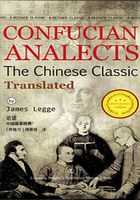
CHAPTER 7
The Master said, "The faults of men are characteristic of the class to which they belong. By observing a man's faults, it may be known that he is virtuous."
6. A LAMENT BECAUSE OF THE RARITY OF THE LOVE OF VIRTUE; AND ENCOURAGEMENT TO PRACTISE VIRTUE. 1. The first four 者 belong to the verbs 好 and 恶, and give them the force of participles. In 使不仁者, 者 belongs to 不仁, and 不仁者=不仁之事. Commonly, 者= 'he or those who', but sometimes also= 'that or those things which'. 尚= 加, 'to add to'. Morr., char.尚, translates the sentence wrongly—'He who loves virtue and benevolence can have nothing more said in his praise'. 3. 盖 here is 疑辞, 'a particle of doubt'. 未之有, a transpose., as in I.26.
7. A MAN IS NOT TO BE RTIERLY CONDEMNED BECAUSE HE HAS FAULTS. Such is the sentiment found in this ch., in which we may say, however, that Conf. is liable to the charge brought against Tszehea, I.7. 人之过也 stands absolutely,—'As to the faults of men'.各=各人, and于=从,—'Each man follows his class'. Obs. the force of 过, 'what goes beyond'. The faults are the excesses of the general tendencies. Comp. Goldsmith's line, 'And even his failings leant to virtue's side'.
